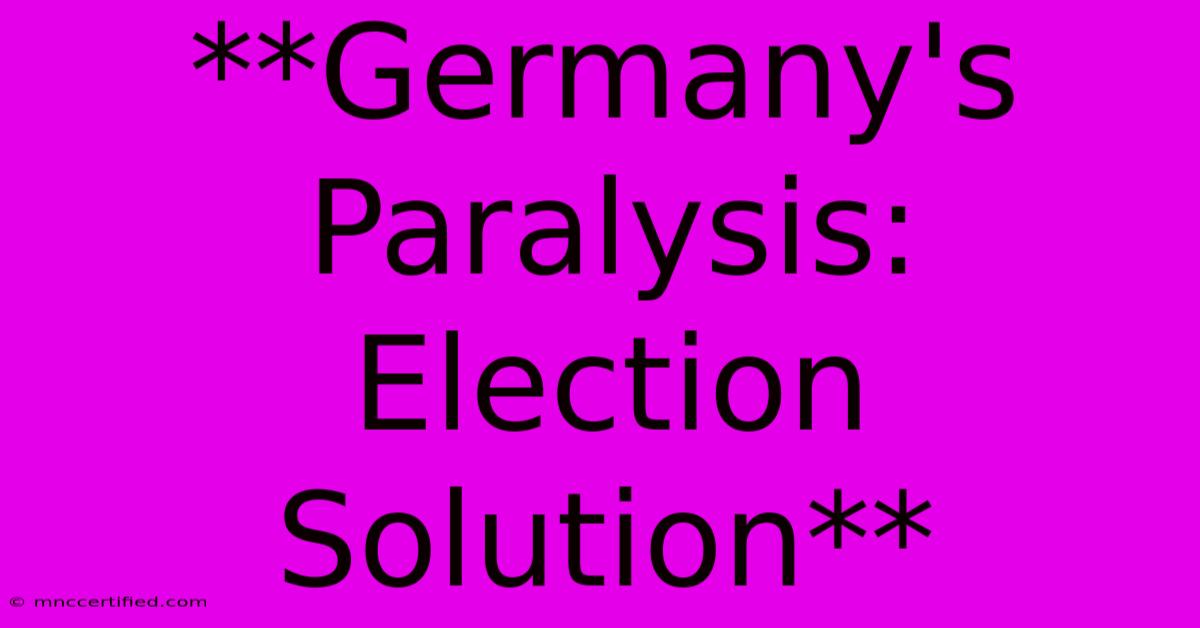**Germany's Paralysis: Election Solution**

Table of Contents
Germany's Paralysis: Can Elections Offer a Solution?
Germany, a nation known for its stability and economic prowess, finds itself grappling with a growing sense of political paralysis. This stagnation, rooted in a fragmented political landscape and a seemingly intractable gridlock, has raised concerns about the country's ability to address pressing challenges, both domestically and internationally. Can elections, the cornerstone of democratic systems, offer a way out of this impasse?
The Root of the Problem: A Fragmented Landscape
The German political scene has become increasingly fragmented, with a proliferation of parties vying for power. This has made it difficult for any single party to secure a majority, leading to the formation of coalition governments. While coalitions can be a legitimate expression of diverse viewpoints, the current situation has resulted in complex negotiations and often sluggish decision-making.
Contributing Factors:
- Rise of Populism and Extremism: The rise of populist and extremist parties, such as the AfD (Alternative for Germany), has further complicated the political landscape, adding to the existing fragmentation.
- Erosion of Traditional Party Systems: The decline of the traditional centre-left and centre-right parties, the SPD and CDU, has also contributed to the fragmentation, as voters seek alternatives.
- The "GroKo" Fatigue: The prolonged period of grand coalitions (GroKo) between the SPD and CDU, despite their ideological differences, has led to a sense of exhaustion and disillusionment among voters.
The Impact of Paralysis: Challenges and Concerns
This political paralysis has had a tangible impact on Germany's ability to address critical issues, both domestically and internationally.
Domestic Concerns:
- Climate Change: Despite Germany's commitment to ambitious climate targets, the slow pace of policy implementation and the lack of consensus on energy transition have raised concerns about the country's ability to meet its environmental goals.
- Social Inequality: The growing gap between rich and poor and the challenges faced by marginalized groups have also been hampered by the slow pace of policy development and implementation.
- Digitalization: Germany has lagged behind other developed countries in adopting digital technologies, with the lack of consensus on regulation and infrastructure hindering its digital transformation.
International Challenges:
- European Union Leadership: The German government's ability to provide strong leadership within the European Union has been hindered by its domestic political struggles.
- Global Power Shifts: Germany's position on the world stage has also been impacted by the political paralysis, weakening its ability to engage with emerging global challenges.
Can Elections Provide a Solution?
While elections are often seen as a means to address political gridlock, the effectiveness of this solution in the German context is a matter of debate.
Potential Benefits:
- Renewal and Realignment: Elections provide an opportunity for voters to express their dissatisfaction with the status quo and potentially elect new leaders who can forge a new consensus.
- Clearer Mandate: The outcome of an election can provide a clearer mandate for a new government, potentially leading to a more unified approach to policymaking.
- Increased Accountability: The prospect of elections can incentivize politicians to be more accountable to voters and to deliver on their promises.
Potential Challenges:
- Fragmented Results: Elections may not necessarily lead to a clear majority for any single party, potentially resulting in another coalition government and continued political instability.
- Populist Gains: The rise of populist parties could be further amplified by elections, exacerbating the political fragmentation and making it even more difficult to form a stable government.
- Limited Impact on Structural Issues: Elections may not necessarily address the underlying structural issues that have contributed to the political paralysis, such as the decline of traditional parties and the rise of new political forces.
Moving Forward: Beyond Elections
While elections can be a powerful tool for political change, it is crucial to recognize that they are not a panacea. Addressing Germany's political paralysis requires a multifaceted approach that goes beyond the electoral cycle.
Key Strategies:
- Strengthening Democratic Institutions: Building stronger and more resilient democratic institutions, such as political parties and parliament, is essential to ensure effective governance.
- Promoting Civil Engagement: Encouraging active participation in civil society and public discourse can help bridge divides and foster a more inclusive and responsive political system.
- Investing in Education and Social Mobility: Addressing social inequality and promoting social mobility can help to mitigate the rise of populism and extremism, fostering a more cohesive society.
Conclusion:
Germany's political paralysis presents a significant challenge to its future stability and prosperity. While elections can offer an opportunity for renewal and realignment, they are not a guaranteed solution. To overcome this impasse, Germany must embrace a broader approach that addresses the underlying structural issues and strengthens its democratic institutions. Only then can it regain its political vitality and effectively respond to the challenges of the 21st century.

Thank you for visiting our website wich cover about **Germany's Paralysis: Election Solution**. We hope the information provided has been useful to you. Feel free to contact us if you have any questions or need further assistance. See you next time and dont miss to bookmark.
Featured Posts
-
Cink Leads Schwab Cup Week In Phoenix
Nov 08, 2024
-
What Insurance Does Jordan Valley Accept
Nov 08, 2024
-
Guarantee Reserve Life Insurance Company
Nov 08, 2024
-
West Brom 0 0 Burnley Points Shared In Controversial Match
Nov 08, 2024
-
German Government Collapse The Reasons
Nov 08, 2024